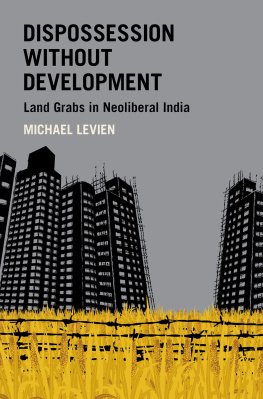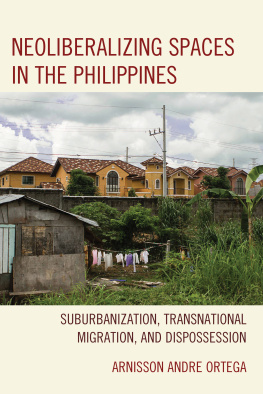- Abbreviations
Dispossession without Development
MODERN SOUTH ASIA
Ashutosh Varshney, Series Editor
Pradeep Chhibber, Associate Series Editor
Editorial Board
Kaushik Basu (Cornell University)
Steven Cohen (Brookings Institution)
Veena Das (Johns Hopkins University)
Patrick Heller (Brown University)
Niraja Gopal Jayal (Jawaharlal Nehru University)
Ravi Kanbur (Cornell University)
Atul Kohli (Princeton University)
Pratap Bhanu Mehta (Centre for Policy Research)
Farzana Shaikh (ChathamHouse)
The Other One Percent
Sanjoy Chakravorty, Devesh Kapur, and Nirvikar Singh
Social Justice through Inclusion
Francesca R. Jensenius
The Man Who Remade India
Vinay Sitapati
<

Oxford University Press is a department of the University of Oxford. It furthers the Universitys objective of excellence in research, scholarship, and education by publishing worldwide. Oxford is a registered trade mark of Oxford University Press in the UK and certain other countries.
Published in the United States of America by Oxford University Press
198 Madison Avenue, New York, NY 10016, United States of America.
Oxford University Press 2018
All rights reserved. No part of this publication may be reproduced, stored in a retrieval system, or transmitted, in any form or by any means, without the prior permission in writing of Oxford University Press, or as expressly permitted by law, by license, or under terms agreed with the appropriate reproduction rights organization. Inquiries concerning reproduction outside the scope of the above should be sent to the Rights Department, Oxford University Press, at the address above.
You must not circulate this work in any other form and you must impose this same condition on any acquirer.
Library of Congress Cataloging-in-Publication Data
Names: Levien, Michael, author.
Title: Dispossession without development : land grabs in neoliberal India / Michael Levien.
Description: New York City : Oxford University Press, [2018] | Includes bibliographical references.
Identifiers: LCCN 2017036637 (print) | LCCN 2017050010 (ebook) |
ISBN 9780190859176 (updf) | ISBN 9780190859183 (epub) |
ISBN 9780190859152 (hbk) | ISBN 9780190859169 (pbk)
Subjects: LCSH: Land reformIndia. | Economic developmentIndia.
Classification: LCC HD1333.I4 (ebook) | LCC HD1333.I4 L48 2018 (print) |
DDC 333.3/154dc23
LC record available at https://lccn.loc.gov/2017036637
To Ismay Lirette and the memory of Druis Lirette (Mamaw and Papaw)
Between the simple backward look and the simple progressive thrust there is room for long argument but none for enlightenment. We must begin differently: not in the idealization of one order or another but in the history to which they are only partial and misleading responses.
CONTENTS
In August 2004, I watched the monsoon rains gather behind the newly raised Sardar Sarovar Dam in central India and flood hundreds of families from their homes. Although India was already over a decade into economic liberalization, large public-sector dams were still the most potent symbols of what was often called development-induced displacement. Since Independence in 1947, the Indian state had uprooted tens of millions of people from their land for projects of economic modernization. Large dams were the single largest cause. The victims were disproportionately indigenous groups living in remote river valleys that made for ideal dam sites. And they were almost always brutally impoverished by their dispossession. Indias postcolonial leaders were, nevertheless, fairly successful in legitimizing this large-scale dispossession as the inevitable and necessary cost of development; over three decades elapsed before popular struggles began to seriously challenge this practice.
From the 1980s onward, the Narmada Bachao Andolan (NBA), the peoples movement against large dams in the Narmada Valley, helped pioneer anti-dispossession politics in India. Its innovative tactics, like refusing to vacate flooding villages, and its defiant sloganssuch as no one will be moved, the dam will not be built and we want development not destructioninspired anti-dispossession movements across India and the world. Nevertheless, these movementsalong with those opposing other public-sector projectsfaced an uphill battle. Tarnished as anti-development and even anti-national, they were ignored by political parties and rarely succeeded in preventing dispossession. Witnessing the devastation of villages that had fought the Indian state for two decades also made me wonder whether dispossession was, indeed, unstoppable.
I was astonished, then, when just a few years later farmer protests were stopping dozens of mega-projects and land grabs were at the center of Indian politics. Just as Indias heated economic boom was hitting its peak during the mid-2000s, a new constellation of land struggles emerged. In contrast to the anti-dam struggles, many were located in the plains rather than forests and river valleys; and their targets now included large private investments: hi-tech parks, real estate colonies, privatized infrastructure, and factories for multinational corporations. Above all, the Indian governments post-2000 strategy of promoting privately developed Special Economic Zones (SEZs) proved to be explosive. Attempts by state governments to transfer large chunks of rural land to private developers for hundreds of SEZs unleashed widespread and militant farmer protest across the country.
On March 14, 2007, Indias simmering land conflicts burst into the national spotlight. In an orchestrated early morning attack, police and party cadre of West Bengals Left Front governmentled by the Communist Party of India (Marxist)massacred fourteen farmers and raped and assaulted many more in a collection of villages called Nandigram. The mostly Muslim and lower-caste Hindu paddy farmers of Nandigram had been refusing to relinquish their land for a private SEZ promoted by the Salim Group of Indonesia. The ensuing uproar shook the West Bengal government, which came under attack by the media, civil society organizations, and opposition parties at the state and national levels. On the defensive, the Left Front not only abandoned the project but suffered grave political damage, which contributed to its subsequent defeat in the 2009 local elections and, after thirty-four years of continuous rule, its ultimate ousting from state power in 2011 (). The national government, for its part, felt compelled to issue a temporary moratorium on land acquisition for SEZs, to reduce their maximum size, and to introduce amendments to Indias Land Acquisition Act (LAA) that would provide greater compensation to farmers.
Meanwhile, so-called land wars appeared to be springing up everywhere, thrusting the names of previously obscure villages into the popular lexicon. The most astonishing feature of these conflicts was that farmers were winning many of them. Militant farmer resistance in peri-urban Mumbai and Gurgaon forced Indias largest private company, Reliance Industries, to abandon its two proposed mega-SEZs. In coastal Odisha, several villages of forest cultivators held up Indias largest proposed Foreign Direct Investment to datea twelve-million-ton steel plant and captive port of South Koreas Pohang Steel Company (POSCO)with bamboo barricades and human chains. In Singur, West Bengal, farmers thwarted the car factory that was to build Tata Motors much-hyped Nano. In Western Uttar Pradesh, farmers engaged in a gun battle over land acquisition for the privately built Yamuna Expressway, which included upscale real estate development and a Formula 1 racetrack. SEZs were facing stiff opposition near Mangalore, Hyderabad, Pune, Chandigarh, and coastal Andhra Pradesh. A statewide opposition movement led to the cancelation of all proposed SEZs in Goa ().
Next page










